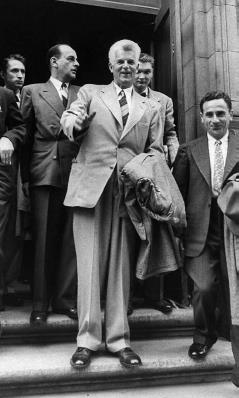The Vinson Court (1946–53)First Amendment |
In what decision did the Vinson Court uphold a federal law designed to charge members of the Communist Party with crimes? |
The Vinson Court upheld the Smith Act of 1940 in Dennis v. United States (1951). The Alien Registration Act of 1940, called the Smith Act after its chief sponsor, U.S. representative Howard W. Smith of Virginia, prohibited individuals from advocating the physical overthrow of the United States. One provision of the law provided: “Whoever organizes or helps or attempts to organize any society, group, or assembly of persons who teach, advocate, or encourage the overthrow or destruction of any such government by force or violence … shall be … imprisoned not more than 20 years.”
Eugene Dennis and eleven other members of the American Communist Party were convicted of violating the Smith Act. They challenged their convictions on First Amendment grounds. The Court upheld the convictions, writing: “Overthrow of the Government by force and violence is certainly a substantial enough interest for the Government to limit speech.” The Supreme Court modified the “clear and present danger” test advocated by former justices Oliver Wendell Holmes and Louis Brandeis in the 1920s. Instead, the Court majority adopted the test advocated by federal appeals court judge Learned Hand. The test provided: “In each case courts must ask whether the gravity of the evil, discounted by its improbability, justifies such invasion of free speech as is necessary to avoid the danger.”

